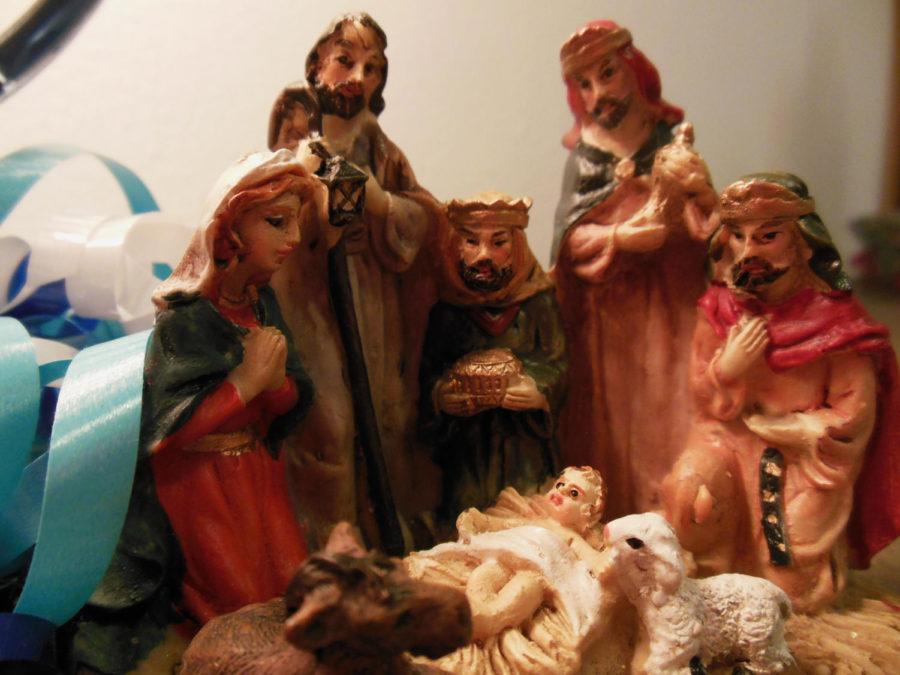Moran: ‘War on Christmas’ Needs to Stop
During the holiday season, Christmas is widely celebrated. For many people, Christmas is the celebration of the birth of Christ. However, there are other holidays celebrated such as Hanukkah and Kwanzaa.
December 6, 2015
As Christmas rapidly approaches, many people are putting their final touches on their Christmas preparations and there’s nothing wrong with that. Decorations are up, Christmas music is more abundant on the radio and workplaces, and a plethora of “unique” holiday sweaters come out of hibernation.
Similarly, the annual argument and idea of a ‘War on Christmas’ is brought back into conversations but this year, I am hearing more about it than ever before.
Whether it be the national controversy over the Starbucks Red Holiday Cups or the University of Tennessee releasing a directive to not allow any religious symbols at campus holiday parties, the ‘War on Christmas’ is in full effect this year accompanied by the argument over happy holidays vs. Merry Christmas.
So let’s break this down, because the entire ‘War on Christmas’ idea is, in simplest terms, unnecessary.
The Starbucks controversy was blown way out of proportion. The argument that they wanted to take “Christ and Christmas off of their cups” was made by Facebook personality Joshua Feuerstein in a video he uploaded to Facebook.
Many took similar stances with Feuerstein saying the cups are adding to the ‘War on Christmas’ while others disagree.
Starbucks released a statement last month describing why the cups were blank. In short, the company noticed many doodled on their cups, so this year they were leaving the cup blank to mimic an open canvas.
These cups created a national controversy. In case that didn’t sink in, a cup created a NATIONAL controversy. Sounds pretty ridiculous, right?
The University of Tennessee is also under fire after releasing a directive to “Ensure your holiday party is not a Christmas party in disguise”.
The directive was posted by UT Chancellor Jimmy Cheek and now some are calling for his resignation, as reported by the local newspaper The Tennessean.
On top of all of this, the “Happy Holidays” vs “Merry Christmas” debate rages on.
A 2013 survey by the Public Religion Research Institute found that 49% of Americans believe stores should be greeting customers with “Happy Holidays”.
December hosts a vast array of holidays; Christmas, Hanukkah, Kwanzaa, Winter Solstice, and Pancha Ganapati just to name a few. The reason many business are switching to “Happy Holidays” is because it doesn’t offend anyone because that greeting is neutral.
The ‘War on Christmas’ is contrived and it’s fueled by empty arguments. In reality, most examples aren’t attacking Christmas, they’re actually trying to be conscious of other religions.
For a very long time, Christianity was by far the most practiced religion in America and with that came “Merry Christmas” and other religious traditions tied to Christianity. Nowadays, that isn’t the case.
The United States is the most culturally and religiously diverse it’s ever been and we can’t be intolerant to other cultures and religions.
Honestly, the ‘War on Christmas’ can be solved in one word: tolerance, tolerance for those around you with different cultures, religions, and beliefs.
I’m not saying you can’t enjoy Christmas or that it shouldn’t be a thing. I love Christmas and everything that come with it, but what I am saying is that the ‘War on Christmas’ is unnecessary. It’s an excuse to continue to be intolerant to other religions.
Once this is realized, we can move forward as a multicultural society and stop fighting this stupid, stupid ‘War on Christmas’.
Wishing someone a “Merry Christmas” is great if they’re Christian, but if you have a friend that’s Jewish, wish them a “Happy Hanukkah”. If you don’t know someone’s religious affiliation, “Happy Holidays” works just as well, because it’s neutral. It’s all about being tolerant of someone else’s religion.
So as the holiday season comes around, Merry Christmas, Happy Hanukkah, Joyous Kwanzaa, Happy Pancha Ganapati, Super Solstice, and Happy Holidays.







